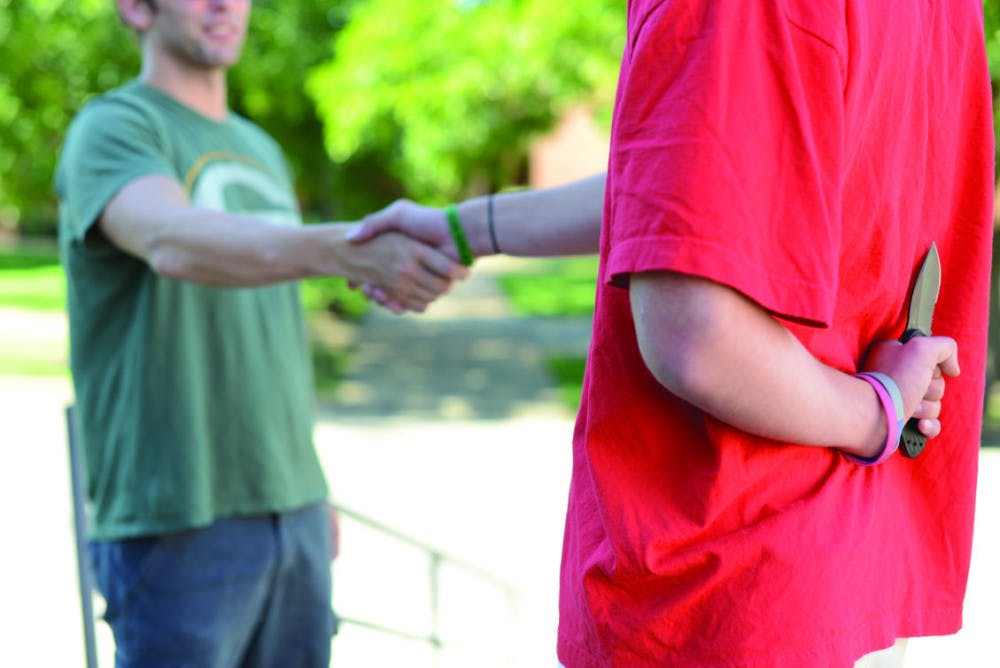Andy Fong saw his brother in his 2004 Honda Accord, frantically honking the horn. He took off in a sprint, leapt into the backseat and they raced away. Leaning back and sighing in relief, Fong noticed he sprained his ankle and cut his knee. He had only wanted to buy a television.
Fong is one of 25 million Americans who lose more than $2.5 billion to fraud each year, according to the Federal Trade Commission. A recent robbery near the University of Memphis that stemmed from an Internet scam illustrates what tactics are often used to reel people into the trap.
The robbery occurred close to campus on Tuesday when a man with a silver handgun approached two men near Patterson Street and Cowden Avenue. The two victims arranged to buy a car with the suspect online. The suspect escaped with their money and cell phones, according to campus police officials.
A police report has yet to be filed and few details have been released, according to Director of University Police Operations Derek Myers.
“We’ve seen it before,” Myers said. “There have definitely been situations like this, but this is the first time close to campus.”
He also cautioned against online purchases.
“This is another one of those deals,” Myers said. “People need to really be wary of buying things online. People need to be really, really skeptical of making purchases like that, big purchases especially.”
In 2012, Fong, dressed in U of M sweatpants and a hoodie, waited with his brother, Daniel, outside of a Hickory Ridge apartment complex. Looking for a new TV, Fong went to Craigslist and found a man named Kenny who said he was selling a 42-inch Samsung LED television. After a few days, the two agreed on a price but not a location.
“I said to meet at Walmart, but he [said] he didn’t want to lug around a giant TV,” Fong said. Fong and his brother met at Kenny’s second-floor apartment. After repeatedly knocking on the door, Fong decided to call him. “He said he was in the shower, but his wife or fiancé would answer the door,” Fong said.
Fong and his brother then noticed someone in a black coat lurking under the apartment stairs and another coming around the corner. They grew concerned when the first man approached and said he was Kenny.
“He acted like he was going to open the door — then the other guy came from the other side with a gun,” Fong said. “He told us to drop everything.” Fong told his brother to run. Having studied martial arts since the age of five, he tried to defend himself. “I grabbed Kenny and threw him between myself and the guy with the gun,” Fong said.
He then leaped off the stairs, rolled his ankle and sprinted away.
“I ran across the whole apartment complex and ended up in an empty field.”
Once he was in the distance, Fong turned back and saw the armed man.
“‘Stop or I’ll shoot,’” the man with the gun screamed, according to Fong. Fong continued running until finding his way to a main road.
There, he heard the sound of his brother’s horn and ran toward his car. Fong jumped into the backseat and they sped off. There are ways to more safely make online purchases. University sophomore civil engineering major Brayden Long, who recently purchased a car off Craigslist, took steps to avoid falling into a similar trap.
“We met at a high school in a residential neighborhood,” Long said. “There were construction workers there, people everywhere.” Long took other cautionary measures as well. “I brought my dad with me,” Long said.
It’s necessary to take such steps when arranging these transactions, according to Myers. Find a crowded area — even the parking lot of a police precinct.
“The more public, the better,” Myers said. “Anywhere that has camera coverage is good too.”
On websites like Craigslist, criminals lure unsuspecting victims offl ine with cheap deals — only to take their money and run.




